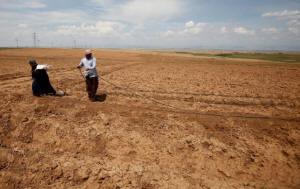|
Special Report: How Iraq's agricultural
heartland is dying of thirst
 Send a link to a friend
Send a link to a friend
 [July 25, 2018]
By Maha El Dahan and Raya Jalabi [July 25, 2018]
By Maha El Dahan and Raya Jalabi
TAL ABU AL-DHAHER, Iraq (Reuters) - One day
in June, a giant irrigation pump deep in the Mosul Dam Lake sputtered
briefly into life. The successful test brought a rare moment of
celebration for the facility's supervisor, Assem Abdel Rahman, and his
small team of engineers from Iraq's Water Resources Ministry.
The pump had lain idle since 2014, when Islamic State fighters swept
into Nineveh, then a lush province capable of producing almost a quarter
of Iraq's wheat. When Iraqi forces and their allies drove out the
militants three years later, the pump was out of action and the
irrigation canals it supplied were in ruins. That June test showed there
was hope for the pump, at least.
"If you could have seen this area before, it was full of green as far as
your eyes could see," said Abdel Rahman, gesturing toward the barren
land.
Getting the pump to work is only a beginning. This year the rains
failed, too, and a new Turkish dam threatens to reduce flows from the
Tigris River into the Mosul Dam Lake. Nineveh is becoming a dust bowl,
and farmers, who came home after Islamic State fled, say they feel
abandoned by Iraq's leaders.

Hani Habib Youhanna, a farmer from the Christian town of Qaraqosh, said
he had poured his savings into planting wheat on his 125 hectares of
land this year, but the crop was disastrous. "Support? There is no
support from the government here at all. No irrigation, just nothing,"
he said.
His complaints are echoed across a country overwhelmed by the cost of
rebuilding from its war with Islamic State and struggling with water
shortages that have led to street protests this year. Much of the city
of Mosul, 30 km to the northwest of Qaraqosh, is still rubble more than
a year after the militants were expelled. In Iraq's long-neglected
south, there have been angry demonstrations over water shortages. The
government has promised to release funds to help. It estimates the total
cost of Iraq's reconstruction at $88 billion.
Nineveh's farmers say for them time is running out. In interviews, a
dozen farmers and grain traders said government wheat production
forecasts for 2018 were hopelessly optimistic. Some farmers said they
were considering leaving the land. Others have joined local militias to
get a regular wage.
"If farmers are pushed to look for another way of life, all the choices
will basically be bad, whether it is smuggling, turning to extremism and
militancy or migration," said Fadel al-Zubi, the Iraq representative of
the United Nations Food and Agriculture Organization (FAO), based in
Baghdad.
Drought could be mitigated by irrigation but, critics say, Iraq's
political leaders are too consumed by infighting to pay attention to the
needs of farmers in places like Nineveh. Zainab al-Taaey, a member of
the outgoing parliament's Committee on Agriculture, Water and Resources,
said the Ministry of Water Resources was not doing enough to tackle
water shortages. The ministry responded that it was working to clean up
the water supply in Nineveh and dig wells to help farmers.
Other critics say inefficiency and corruption are starving Nineveh of
funds. Iraq ranks 169 out of 180 countries on Transparency
International's corruption index. Another committee member, Sherouk
al-Abaigy, said successive governments had failed to come up with a
comprehensive water plan. The ministry said the security situation
across Iraq, where Islamic State still poses a threat, and a lack of
funds were complicating its efforts, but it continued to work in
Nineveh. It said its engineers were capable of implementing big projects
and noted that Minister of Water Resources Hassan Janabi was a
technocrat with a PhD in water management.

As farmlands diminish, Iraq's wheat import bill will rise. That's extra
spending the country can ill afford. This year, the state Grain Board
expects to import around two million tonnes of wheat at a cost of around
$1.5 billion. The Farmers Union reckons the board may need to bring in
an additional one million tonnes because of the poor harvest.
WAR AND DICTATORSHIP
The pump in the Mosul Dam Lake sits at the start of the North Al-Jazeera
irrigation system, built three decades ago on the order of Saddam
Hussein. Abdel Rahman has worked there since the beginning. North
Al-Jazeera was part of an ambitious irrigation project, the biggest at
the time in the Arab world, that was to include a southern and eastern
facility. Had it been completed, it would have watered 250,000 hectares
of the Al Jazeera plain.
But Iraq's invasion of Kuwait in 1990 led to U.N. sanctions, and foreign
firms involved in the irrigation project, such as South Korea's Hanyang
Corporation, left Iraq. Plans for the east and south facilities were
abandoned.
Working as a standalone, the north pump provided thousands of farmers
with a steady supply of water, enabling them to grow summer vegetables
and winter grains. The irrigation system reached 60,000 hectares of
land, around a quarter of Nineveh's potentially fertile land.
When a U.S.-led invasion toppled Saddam Hussein in 2003, the area where
the pump is located was relatively unscathed. Some U.S. troops even used
it as a base because of its concealed location inside a hill, Abdel
Rahman said. "When the Americans came here in 2003 and saw the control
panel inside the hill, they joked, 'What is this, a nuclear station?'"
he recalled. The panel, which is still on display in the control room,
was replaced by two laptop computers in 2012.
In the summer of 2014, Islamic State fighters arrived, and Abdel Rahman
fled to the safety of Erbil, in Kurdish northern Iraq. He said the
militants tried to make the pump work but they didn't know what they
were doing and damaged the equipment. Fighters looted cables from the
station, and most of North Al-Jazeera's smaller subsidiary pumps,
bridges and canals were wrecked in the battle for Nineveh that started
in 2016. When that conflict subsided, another threatened: The pump sits
in territory also claimed by Iraq's Kurds. In Oct. 2017, Iraqi forces
launched another offensive and took back control of the area.
When the fighting stopped, Abdel Rahman was eager to resume his work.
But he found a scene of destruction. One hundred of the irrigation
system's 280 canals are still out of commission, according to the United
Nations. Many are filled with debris and explosives planted by the
militants in an attempt to keep government forces at bay. Thirty of the
38 metal bridges have been blown up and 800 sections of elevated canal
have been destroyed.
The U.N. set about fixing North Al-Jazeera with the help of
international donors. The cost is estimated at over $9 million,
excluding repairs to a local factory that manufactured components for
the pipes. Iraq's Ministry of Water Resources has cooperated with the
U.N. on technical details but hasn't allocated any of its own funds to
the effort. Ministry adviser Zafer Abdullah said the North Al-Jazeera
project needed a large budget and the ministry was prioritizing "needs
that touch people's everyday lives."
The first phase of repairs – demining, restoring power and fixing the
main pumping station – is due to be completed by the end of 2018. The
U.N. says more work will be needed to get water flowing to the
subsidiary pumps and into the network of canals. "Within two years or so
we hope to have it functional," said the FAO's Iraq representative Zubi.
"NOTHING WILL EVER CHANGE HERE"
Farmers say they can't wait that long. When Islamic State fled,
Nineveh's farmers began returning, hoping to rebuild their homes and
livelihoods. Some, like Qaraqosh farmer Youhanna, who came home last
year, are already giving up. "I'm not going to plant anything anymore.
Where will I get the money from?" he said.
[to top of second column]
|

Iraqi farmers work in their fields north of Mosul, Iraq May 2, 2018.
Picture taken May 2, 2018. REUTERS/Khalid Al-Mousily

Islamic State burned Youhanna's home and stole his equipment. He found
his tractor in Mosul amongst a pile of goods looted by the militants.
Youhanna's teenage son lost three fingers when a mine exploded as they
set about rebuilding their home. Like several other farmers, Youhanna
now relies on a salary from a local militia.
"I know that in terms of politics, it is all the same. Nothing will
ever change here. But I support them because they are the ones who
are supporting me now," he said.
Another Qaraqosh farmer, Sami Nissan Yessi, said his equipment too
had been ransacked and his barns burned. His prospects are poor. "My
kids are in Germany and Canada. I returned with my wife and younger
child. This is me, I'm a farmer. What will I do abroad?" he said.
Only two farmers in Qaraqosh managed to grow wheat this year. One of
them, Tawfiq Abosh, 70, credited the small irrigation system he
built eight years ago. When Islamic State left his family's farm,
they stole or destroyed irrigation equipment, including the motors
needed to power the pumps. Abosh sold the family's gold and took out
loans to rebuild the system. Today it is working once more, watering
Abosh's melon and cucumber crops.
He said he spends roughly $250 a month on petrol and electricity to
power the pumps, an outlay he says he can no longer afford without
government help. During two visits by an Agriculture Ministry
official in December and March, Abosh said he asked for financial
help to keep his farm going. He said he has yet to hear back. The
Agriculture Ministry told Reuters it was supporting farmers, like
Abosh, by giving them subsidized seeds and fertilizer and by paying
them good prices for their crops.
Knowing there will be a long wait to restart the North Al-Jazeera
project, some farmers have moved closer to the reservoir.
Small-scale farmers planting summer vegetables have paid the
government to be allowed to connect pipes to the reservoir as
makeshift irrigation systems.
"What else can we do?" said Naif Mohammed Khalaf, a farmer who was
planting tomatoes and watermelon on rented land.

Farmers say cumbersome government practices compound their problems.
Farmers eligible for back payments for grains sold to the Trade
Ministry since 2014 are checked to make sure they have no ties to
Islamic State, delaying the release of money. Some farmers say they
are still waiting for payments for 2014 crops. The head of the state
Grain Board, Naeem al-Maksousi, said only around five percent of
farmers were still due money from 2014 because of the security
checks.
Authorities have ruled that fertilizer distributed to farmers in
Nineveh must be free of urea, a chemical used in explosives.
Sometimes the government provides urea-free fertilizer, but often it
simply adds dust to the urea fertilizer to make it safe. That also
makes the fertilizer less effective, farmers say. And government
fertilizer often arrives late. The Agriculture Ministry said it was
sometimes late distributing fertilizer because of the security
situation. It said it checked the quality of fertilizer it supplied
and disputed that it was ineffective.
DESERTED SILOS
The financial burdens on the state are growing. Iraq may have
declared victory over Islamic State, but the militants still pose a
threat, and the country spends billions of dollars each year on
security.
Iraq also spends billions of dollars on a Saddam-era program, the
Public Distribution System, to supply subsidized bread and other
essential foods to the population. Iraq's Grain Board is responsible
for procuring and distributing wheat. Its head, al-Maksousi, said
the board expects to get 350,000 tonnes of wheat from four silo
complexes in Nineveh this year. But by mid-July, well into harvest
time, only 103,000 tonnes had been collected, according to Nineveh's
director of agriculture, Dreid Hekmat.
Tahseen Hussein was until recently the director of one of the four
silo complexes, Bazwaya, which can hold up to 250,000 tonnes of
wheat. The Grain Board set a target of 92,000 tonnes for the Bazwaya
facility this year but Hussein estimated it will get only half that
amount, blaming the drought.
On a morning in June two weeks into buying season, roughly 20 trucks
were lined up outside Bazwaya, loaded with wheat to be tested and
sold. Usually at this time of year there would be several hundred
trucks, farmers, traders and a silo worker said. They said much of
the wheat was from Kurdish areas, where there were fewer ready
buyers. "There is barely any wheat anywhere in this area," said
Abosh, the Qaraqosh farmer.
Around an hour and a half drive from Bazwaya are the Waeliya silos.
The facility was built in 1989 to hold up to 180,000 tonnes of
wheat. Today it is deserted, damaged by air strikes during the
battle for Nineveh. Nowadays, only a guard and stray dogs greet
visitors. On the paths between the silos, white flags mark the spots
where landmines have been removed, while red flags warn of danger.
Birds flock through holes in the walls and ceilings.

"Islamic State took positions in these silos and mined the land
around them," said Abdel Aziz Saber, an Egyptian guard who has been
living in Iraq since 1989.
There is another obstacle to reviving Nineveh's farmland. The water
level in the Mosul Dam Lake that feeds the irrigation system has
receded from around 330 meters above sea level before the drought to
around 306 now, too shallow to operate the North Al-Jazeera pump
year-round when it finally restarts. Turkey's Ilisu dam a few
kilometers upstream along the Tigris River could make matters worse.
Around 70 percent of Iraq's water flows from neighboring countries,
most of it along the Euphrates and Tigris rivers. The Euphrates is
already heavily dammed in Syria and Turkey. The Tigris pours into
the Mosul Dam Lake.
There are ways to alleviate problems caused by the Ilisu dam, the
FAO's Iraq representative Zubi said. Turkey could use the spring
flooding season to fill the dam reservoir, for example. Iraq and
Turkey have already negotiated a series of delays to filling the
reservoir. Turkey's ambassador to Baghdad, Fatih Yildiz, said in
June Turkey would consult with Iraq on "how we can cooperate and
provide support during any problem."
Abdel Rahman remains optimistic. The successful test on the pump has
given him hope. The South Korean contractor that built the
irrigation project gave the equipment a lifespan of 25 years. He
says he's proud of maintaining it well beyond that.
"Once it is working again, you will see what we can have here," he
said.
(Additional reporting by Moayed Kenany in Baghdad. Editing By Janet
McBride, Michael Georgy and Richard Woods)
[© 2018 Thomson Reuters. All rights
reserved.]
Copyright 2018 Reuters. All rights reserved. This material may not be published,
broadcast, rewritten or redistributed.
Thompson Reuters is solely responsible for this content. |